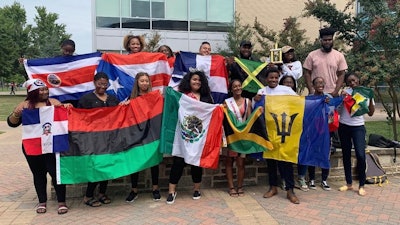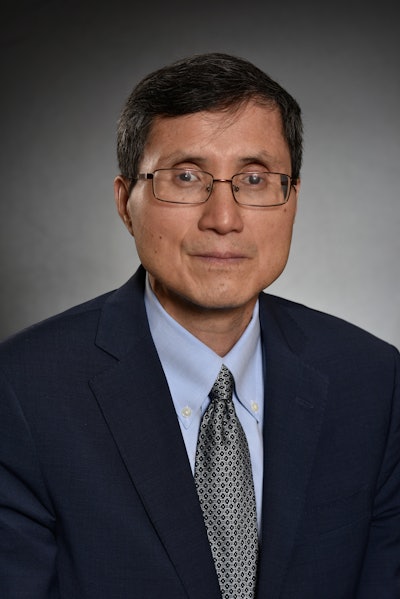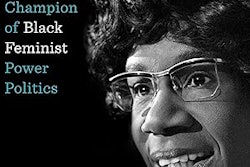Morgan State University, the largest of Maryland’s four historically Black colleges and universities, is thriving. Enrollment is strong. There is record external and state funding. There is institutional focus on achieving Research-1 status. Innovative programming continues to grow, and the student body is more diverse than ever.
The long-running lawsuit between Maryland’s HBCUs and the state was finally settled, and Morgan State received its first appropriation from those funds on July 1, 2022, amounting to $15.1 million. Morgan State President Dr. David K. Wilson says that money is funding existing and new programs.
“We’re looking around the country, having discussions with potential employers to get a sense of the work of the future and the future of work, to start new academic degree programs that when our graduates finish, they will be in high demand and earn competitive salaries,” says Wilson. “We’re trying to break down barriers.”  Student groups at Morgan State include organizations for African students, Caribbean students, Latinx students, and international students.
Student groups at Morgan State include organizations for African students, Caribbean students, Latinx students, and international students.
Retention efforts
Morgan State is currently number one in the United States in producing Black electrical engineers and civil engineers, Wilson notes. The university has an excellent reputation in the sciences and continues to innovate. This requires thoughtful retention efforts.
Dr. Tiffany Beth Mfume, associate vice president for student success and retention, says her office is involved from the time a student is admitted to the university until he or she graduates. Upon admission, someone from the office oversees the transition process—orientation, advisement, financial clearance and registration prior to the student’s first term and support through the first year.
“Our students have a professional advisor on my team who works with them until they earn 24 credits with a minimum cumulative GPA of 2.0 and a declared major,” says Mfume, herself a Morgan State alumna. “At that time, they transition to either a professional advisor in their school or major or mostly to faculty advisement.”
Prior to earning 24 credits, students must discuss all decisions with an advisor, including withdrawing from a class, changing majors or registration. Once students transition out of that first-year format, the success and retention office continues to work with them through graduation.
“We have an early alert system where faculty let us know at least twice during the semester if students are on track or not on track, if they’re behind on assignments or their quiz or test scores are not up to par, or even if they’re getting positive feedback,” Mfume says. “We monitor and follow up with all of those faculty alerts.”
If a student is not meeting certain milestones, someone from Mfume’s office will reach out to the student and help arrange tutoring or other services. There is a second-year experience in which students are strongly encouraged to engage in a high-impact practice, such as research with faculty or service learning, which increase persistence. Mfume personally writes to any student who tries to drop all classes or withdraw from the university. “That has been the most informative change that we’ve made,” she says. “Students know that we care enough to not let them walk away, and we see the reasons why students are leaving. Then, I can respond to that.”
Students further see examples of perseverance on campus, according to President Wilson. He says the university wants speakers whose life stories are compelling, inspiring, and motivating to propel the graduates forward. Wes Moore, then governor-elect of Maryland, delivered the keynote speech at Morgan State’s fall commencement ceremony.
“Wes Moore has lived a life of struggle, he has had failures, he has persevered, and he has achieved at the very highest levels,” says Wilson. “To become the first African American governor in Maryland’s history, the third African American governor in U.S. history…means a great deal to our students, who are graduating, to their families and to those watching via live stream to see history.” Dr. Hongtao Yu
Dr. Hongtao Yu
Morgan State also has an alumnus mentoring program. Prior to the COVID-19 pandemic, there was a special alumni breakfast with freshmen during homecoming weekend, and she’s glad to see in-person events resume.
“We lay a really strong foundation that this is not like any other university,” Mfume notes. “That’s the Morgan legacy.”
Diversity celebrated
“Every serious higher education institution in the country should be paying attention to the great diversity on their campuses — across faculty, staff and students,” says Wilson. “We try to create an environment where students understand they are in a living laboratory and that laboratory is one where there are so many different cultures, so many different histories… We want you to grow in understanding of others.”
Natasha A. Lewis-Williams, executive director of the University Student Center and Office of Student Life and Development, says a large part of her job focuses on celebrating diversity and inclusion. Her office encourages students to create student organizations, particularly students who want greater representation for their backgrounds or identities.
“If we do not have a student group, then we welcome you to create one,” says Lewis-Williams, who earned both her bachelor’s and master’s degrees at Morgan State. “Since we’ve opened those doors, we’ve had an overwhelming response of different cultural organizations that have helped our students feel more at home here.”
Current student groups include organizations for African students, Caribbean students, Latinx students, One Trybe (international students) and the multi-cultural sorority, Sigma Lambda Gamma. Disabled the Label provides a safe space for students with a diverse range of disabilities.
“Disabled the Label focuses on taking away the stigma of disability,” Lewis-Williams explains. “They have done so many events and programs that encourage students with disabilities to participate in leadership development programs. We’ve had a number of people who are part of Disabled the Label serve in our SGA (student government association) and they’ve done amazing work. Their objective is to provide support and mentorship. Their core values are students first, community involvement, freedom of speech and choice.”
S.O.U.L. (Students Open to Unique Love) is Morgan State’s official gay, straight, bisexual, fluid, transgender, queer and questioning alliance, which has consistently grown over the years. As a student club, it produces its own events, but also partners with the University Student Center on events such as the alternative student prom.
“Right now, through our office we’re using social media as a platform to give a voice to some students that feel like they don’t have it,” Lewis-Williams says.
The Center plans programs for Hispanic Heritage Month, All Heritage Month and an international food festival. There is also programming for pressing issues, such as voting.
“We’re trying to connect in different ways,” she says. “We’re a very diverse campus. We try our hardest to make sure that our students are exposed to new things. Our main core value at the university is respect.”
Looking forward
Dr. Hongtao Yu, provost and senior vice president for academic affairs, is focused on bringing Morgan State University to Carnegie Classification Research-1 status. A research chemist, Yu is committed to advancing diversity in higher education and serving underrepresented populations, particularly in the sciences.
“There are several factors [to R-1 status],” says Yu. “One is doctoral graduates. Two is the research funding, then research personnel.” There are currently 23 doctoral programs. “We have several research centers at the university…to deal with problems that are important for the people in Maryland and also specific for people in the city of Baltimore,” Yu continues. “We want to put together researchers to conduct research in these areas.”
In addition to the centers doing research relevant to the state and city, Morgan State has other centers that address pressing issues, such as civil rights in education, data analytics and sports gaming research, global studies and international education, and the study of race and culture in sports.
In November, Morgan State submitted a proposal for the U.S. Air Force’s planned University Affiliated Research Center (UARC), which will study tactical autonomy. “We have the personnel we need to manage the UARC, should that be awarded,” says Yu. “We do have the vision to work with other HBCUs and not only bring Morgan to where we need to be, but we would like to work with the other HBCUs.” In the last two years, Morgan State introduced over 25 new degrees. Among those are 18 degree programs — eight bachelor’s degrees, five master’s degrees, and five doctoral degrees — that are part of Morgan Completes You, an initiative for traditional and non-traditional undergraduate and graduate students who have excellent potential to complete their degrees, but need flexibility, opportunity and accessibility to various completion options through the university’s new College of Interdisciplinary and Continuing Studies.
Wilson says it’s an effort to go after some of the nearly 40 million adults in the U.S. with some college and no degree. $1.5 million of the $15.1 million has been allocated to start the new college. He anticipates 1,000 to 2,000 students will be studying online as part of Morgan Completes You over the next three years.
There are also new programs that address contemporary issues. “We’ve been working with some companies, including government entities, to develop the workforce,” Yu says. One of the new programs is in cloud computing. The university is about to launch a climate coastal science and policy program. “We’re constantly looking at what kind of programs we can bring to serve society. … Access will continue to be our trademark.”


















